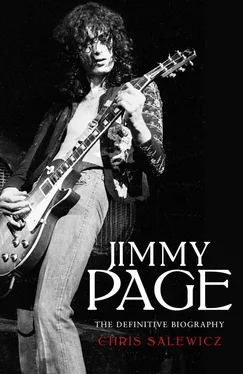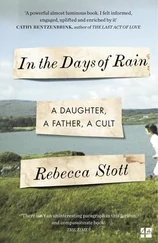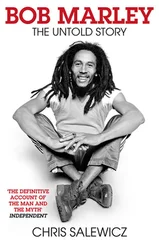Page’s friendship with Eric Clapton continued to blossom, and soon Slowhand, as Clapton ironically became nicknamed, would often be accompanied by his beautiful French girlfriend, Charlotte ‘Charly’ Martin, who was friends with Jeff Dexter. Clapton met her in the Speakeasy nightclub in the summer of 1966, while he was forming his next group, Cream.
Problems with Immediate Records, however, almost created a rupture in the camaraderie between the two guitarists. Without informing Clapton, the label released some tunes that he had recorded onto Page’s Simon tape recorder when Clapton had stayed at his house – which led to Clapton mistrusting Page for a time. Yet this suspicion was misplaced. ‘I argued that they couldn’t put them out, because they were just variations of blues structures, and in the end we dubbed some other instruments over some of them and they came out, with liner notes attributed to me … though I didn’t have anything to do with writing them. I didn’t get a penny out of it, anyway,’ Page said, revealing what was for him generally a key subtext to any endeavour. (The musicians who overdubbed these instruments onto Clapton’s basic tracks were Bill Wyman, Charlie Watts and Mick Jagger, on harmonica.)
Born in 1939 in west London, Simon Napier-Bell was the son of a documentary filmmaker. After attempting to become a jazz musician in the United States, he drifted into music supervision for movies in Canada; eventually he returned to London, where he continued in the same line of work, including on the 1965 screwball comedy What’s New Pussycat? He expanded into the production of records and demos, and he would use popular London studios such as Advision on Bond Street and Cine-Tele Sounds Studios, popularly known as CTS, in Kensington Gardens Square, the top film-music studio in London. He would employ session musicians recommended by Dick Katz, who booked all the top players in London.
Highly intelligent and witty, Napier-Bell became something of an archetypal character of Swinging London, a gay man who was known for driving around in an imported Ford Thunderbird, a cigar clenched between his teeth. His best friend was Vicki Wickham, the producer of Ready Steady Go! , the hip pop music show broadcast every Friday night on ITV. Almost as a jape, he and Wickham co-wrote the English lyrics for the Italian ballad ‘Io Che Non Vivo (Senza Te)’, which had been featured at the 1965 San Remo Festival; their friend Dusty Springfield sang at the event and had been moved to tears by the song’s music and melody. Knocking up their set of English lyrics to match the music in an hour so that they could head out to a London nightclub, Wickham and Napier-Bell gave the tune its title, ‘You Don’t Have to Say You Love Me’. Recorded by Dusty Springfield, the song was a number one hit in the UK and number four in the United States; in subsequent years it would be a hit again many times over, across the globe, with even Elvis Presley doing a version of it in 1970.
By the time Napier-Bell wrote the ‘You Don’t Have to Say You Love Me’ lyrics, he was manager of the Yardbirds, having replaced Giorgio Gomelsky. That the talented and fascinating Gomelsky had been fired was perhaps not surprising; later he declared, ‘I should never have been a manager: I need someone to manage me.’ Though there were no suggestions of impropriety, the Yardbirds had dismissed him because of his inability to turn a profit for the group. All the same, Gomelsky had been an inspirational figure for the Yardbirds, under whose auspices they had become a hit recording act. During their first US tour in 1965 he had even secured a recording session at Sun Studio in Memphis with Sam Phillips, who had mentored Elvis Presley early in his career. The tune they recorded? The Tiny Bradshaw 1951 jump-blues classic ‘Train Kept A-Rollin’’, reworked in a rockabilly style by the Johnny Burnette Trio in 1956, and included on the Yardbirds’ US album release Having a Rave Up . ‘Train Kept A-Rollin’’ was a song that would replay significantly in the Yardbirds’ career.
‘Some time around the end of 1965 or the beginning of 1966,’ recalled Napier-Bell, ‘Paul Samwell-Smith, who played bass with the Yardbirds, called me. His girlfriend, later his wife, was Vicki Wickham’s secretary. I went to a gig the Yardbirds played in Paris. I quickly realised that a manager’s job was to keep the group together.’
Behind Napier-Bell’s management of the Yardbirds lay a continuous awkward subtext: ‘The Yardbirds were blokes in a pub talking about football. I was gay and couldn’t really enter into that world.’
During his time working in recording studios Napier-Bell had always employed session musicians. ‘You never think session players aren’t playing well: they know they are in the top league, the best in the world. They can play next to the guys in LA who would play with Sinatra.’
Napier-Bell’s first choice for guitarist was ‘always Big Jim Sullivan’. Even though, he says, ‘these guys were all infuriating. They’d put you through it. Big Jim Sullivan would always have a paperback book with him that he would read as you did a take: it would be balanced on his music stand. He would even read it halfway through the take until it came to his moment – he would be doing it to show off.’
If an additional guitarist was required, it would invariably be Page. ‘He and Big Jim would work out their parts between them. I talked to Jimmy Page enough to know he was a real session player. I knew he was a brilliant technician and admired by others. We’d also use John Paul Jones, who did all the arrangements for Herman’s Hermits. But I never really liked Jimmy Page. He had a sneer about him. At school the people who bullied me had this terrible, frightening sneer and Jimmy Page reminded me of those people. People who sneer have usually had unhappy childhoods.’
On 16 and 17 May 1966, at IBC Studios in London’s West End, Jeff Beck and Page were involved in what in retrospect can be seen as one of the very first super-sessions.
The tune was ‘Beck’s Bolero’. Maurice Ravel’s Boléro , which was first performed in 1928 at the Paris Opera, provided the basis for ‘Beck’s Bolero’; the Russian ballet dancer Ida Rubinstein had commissioned Ravel to write the work, an undulating, insistently repetitive piece based around the Spanish music and dance known as bolero.
By 1965, largely influenced by the tastes of the likes of Paul McCartney, always an assiduous culture vulture, assorted classical composers had become fashionable among fans of what formerly would have been known as ‘pop’. These composers included Bach, Sibelius, Stravinsky, Prokofiev, Gershwin, Debussy and Ravel, whose Boléro was relatively well known in 1966. The song’s structure is considerably amended in such a way that it could be interpreted as the first blow of the hard-rock sound that Led Zeppelin would very soon develop.
‘Beck’s Bolero’ employed a formidable cast: Beck on lead guitar, Page on acoustic, revered session pianist Nicky Hopkins, the Who’s Keith Moon on drums and John Paul Jones on bass. The Who’s John Entwistle, Moon’s bass-playing rhythm partner, had originally agreed to do the session, but when he failed to turn up John Paul Jones was called in.
‘I heard rumours that Jimmy was talking with Keith Moon about joining his supergroup,’ said Napier-Bell. ‘I don’t think the name Led Zeppelin was in the air at that time, though it may have been mentioned between them. Cream was being formed at the same time. Whether that had much influence on Beck, Page and Moon, I don’t know. The Who’s managers, Kit Lambert and Chris Stamp, were in the same building as Clapton’s manager, Robert Stigwood. So when he was putting Cream together, they would have known all about it, as I did too. Keith Moon would have heard from Kit and Chris as to what was going on too. From my point of view, I was thinking only of keeping Jeff in the group [the Yardbirds]. Jimmy, I think, was thinking of a new group, which would be a blend of all their talents.’
Читать дальше












